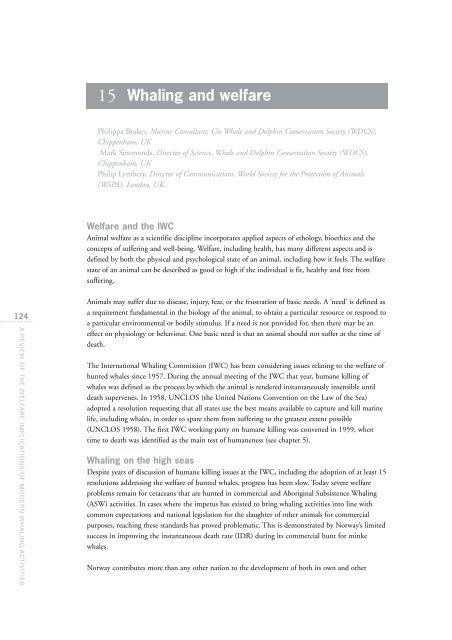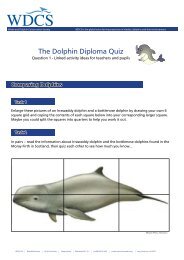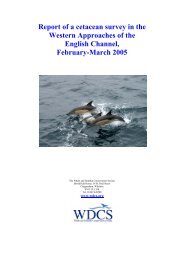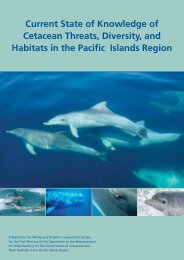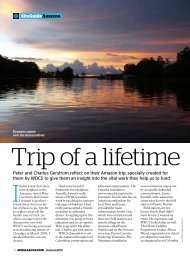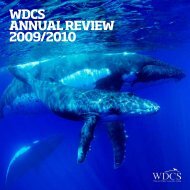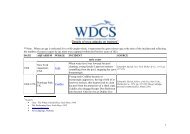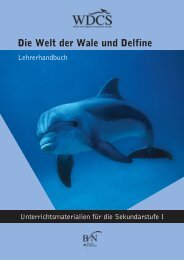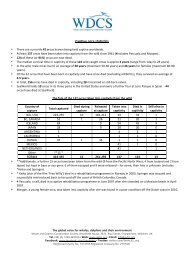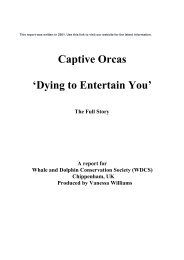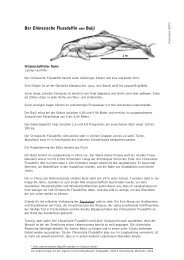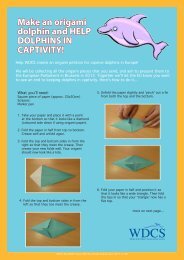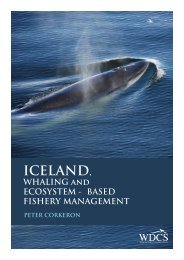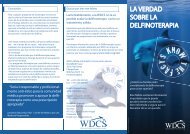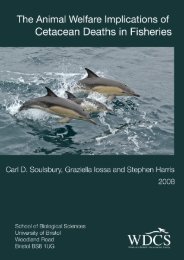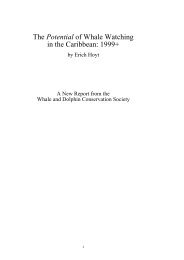TROUBLED WATERS - Whale and Dolphin Conservation Society
TROUBLED WATERS - Whale and Dolphin Conservation Society
TROUBLED WATERS - Whale and Dolphin Conservation Society
You also want an ePaper? Increase the reach of your titles
YUMPU automatically turns print PDFs into web optimized ePapers that Google loves.
124<br />
A REVIEW OF THE WELFARE IMPLICATIONS OF MODERN WHALING ACTIVITIES<br />
15 Whaling <strong>and</strong> welfare<br />
Philippa Brakes, Marine Consultant, C/o <strong>Whale</strong> <strong>and</strong> <strong>Dolphin</strong> <strong>Conservation</strong> <strong>Society</strong> (WDCS),<br />
Chippenham, UK<br />
Mark Simmonds, Director of Science, <strong>Whale</strong> <strong>and</strong> <strong>Dolphin</strong> <strong>Conservation</strong> <strong>Society</strong> (WDCS),<br />
Chippenham, UK<br />
Philip Lymbery, Director of Communications, World <strong>Society</strong> for the Protection of Animals<br />
(WSPA), London, UK.<br />
Welfare <strong>and</strong> the IWC<br />
Animal welfare as a scientific discipline incorporates applied aspects of ethology, bioethics <strong>and</strong> the<br />
concepts of suffering <strong>and</strong> well-being. Welfare, including health, has many different aspects <strong>and</strong> is<br />
defined by both the physical <strong>and</strong> psychological state of an animal, including how it feels. The welfare<br />
state of an animal can be described as good or high if the individual is fit, healthy <strong>and</strong> free from<br />
suffering.<br />
Animals may suffer due to disease, injury, fear, or the frustration of basic needs. A ‘need’ is defined as<br />
a requirement fundamental in the biology of the animal, to obtain a particular resource or respond to<br />
a particular environmental or bodily stimulus. If a need is not provided for, then there may be an<br />
effect on physiology or behaviour. One basic need is that an animal should not suffer at the time of<br />
death.<br />
The International Whaling Commission (IWC) has been considering issues relating to the welfare of<br />
hunted whales since 1957. During the annual meeting of the IWC that year, humane killing of<br />
whales was defined as the process by which the animal is rendered instantaneously insensible until<br />
death supervenes. In 1958, UNCLOS (the United Nations Convention on the Law of the Sea)<br />
adopted a resolution requesting that all states use the best means available to capture <strong>and</strong> kill marine<br />
life, including whales, in order to spare them from suffering to the greatest extent possible<br />
(UNCLOS 1958). The first IWC working party on humane killing was convened in 1959, when<br />
time to death was identified as the main test of humaneness (see chapter 5).<br />
Whaling on the high seas<br />
Despite years of discussion of humane killing issues at the IWC, including the adoption of at least 15<br />
resolutions addressing the welfare of hunted whales, progress has been slow. Today severe welfare<br />
problems remain for cetaceans that are hunted in commercial <strong>and</strong> Aboriginal Subsistence Whaling<br />
(ASW) activities. In cases where the impetus has existed to bring whaling activities into line with<br />
common expectations <strong>and</strong> national legislation for the slaughter of other animals for commercial<br />
purposes, reaching these st<strong>and</strong>ards has proved problematic. This is demonstrated by Norway’s limited<br />
success in improving the instantaneous death rate (IDR) during its commercial hunt for minke<br />
whales.<br />
Norway contributes more than any other nation to the development of both its own <strong>and</strong> other


